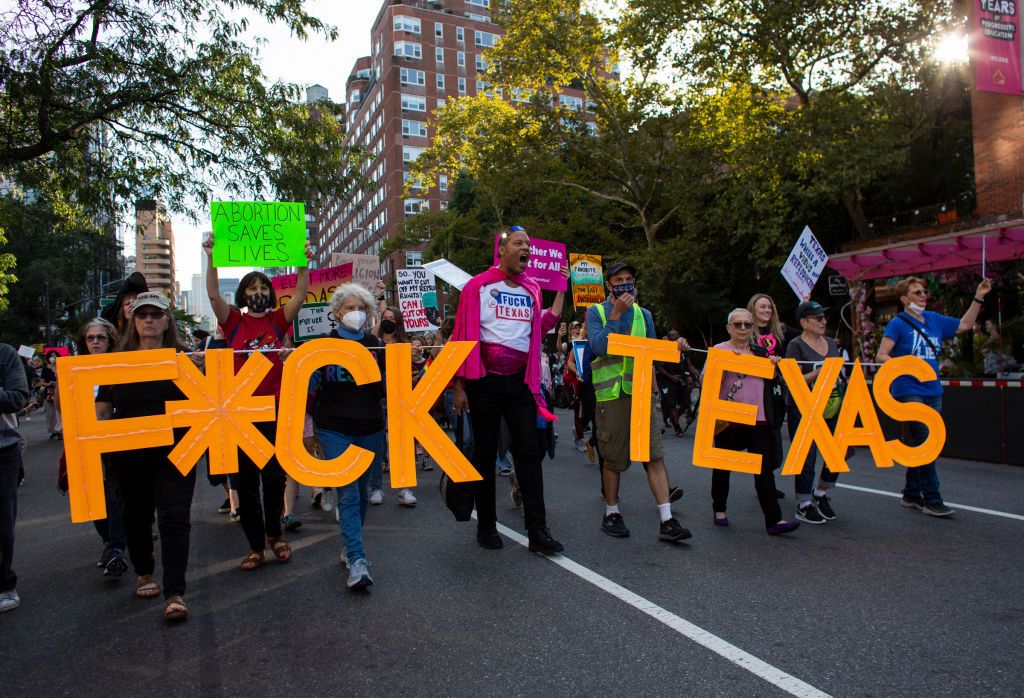Abortion Justice Marches Leverage National Network In Support Of State And Local Organizing
Source: KENA BETANCUR / Getty
Over four years after the inaugural Women’s March, people across the country gathered in defense of abortion justice. With the chilling effect left by the Texas abortion ban, complete with vigilante enforcement provision and pending litigation challenging the constitutional right to abortion established by Roe v. Wade, people across the country are concerned.
But having attended the initial march in D.C., with a critical eye, and later speaking at a Women’s March Power to the Polls event, I wondered aloud to Twitter what was the point of marching yet again? What exactly would be the next steps?
The #RallyForAbortionJustice is officially starting NOW.
Join us, over 120 partners, and more than 5,000 people in D.C. — along with a number of special guests and performances.
Watch LIVE here: https://t.co/jiRcHBha3v
— Women’s March (@womensmarch) October 2, 2021
I asked, and Black women answered. Kentucky state Rep. Attica Scott responded to the tweet explaining that people in her state were organizing against bad bills, pro-choice legislators filed a bill to codify Roe, and people supported pro-choice candidates.
Thanks for this, sis! In KY:
1⃣ we have a statewide coalition organizing canvassing + phone banking to defeat a constitutional amendment in 2022 that would ban abortion
2⃣ my colleagues recently filed a bill to codify Roe v Wade here
3⃣ we’re supporting pro-choice candidates https://t.co/hBqmwBLJq3
— Attica Scott (she/her) (@atticaforky) October 2, 2021
Jennifer Driver, senior director of reproductive rights for the State Innovation Exchange, responded that her work looked like supporting the efforts of several state legislators. Across the country, such as state Rep. Park Cannon in Georgia, state Rep. Athena Salman in Arizona, and state Rep. Stephanie Howse from Ohio.
It’s working with state legislators like FL @AnnaForFlorida, KY @atticaforky, GA @Cannonfor58, MI @SenErikaGeiss, AZ @AthenaSalman and @RaquelTeran, NC @juliefornc and @NatalieforNC, OH @stephaniehowse, PA @RepCephas and so many more working on proactive legislation in states! https://t.co/NpFAjIGKl9
— Jennifer Driver (she/her) (@_jenniferdriver) October 2, 2021
Tamika Middleton, deputy director for the national Women’s March, echoed these sentiments. Speaking with NewsOne, Middleton said it was important that as a national organization with high visibility, it was important for this year’s march to include the people on the frontlines of the fight to protect and expand abortion access.
Leveraging the national platform and visibility of the Women’s March, Saturday’s actions are a part of a coalition effort bringing together over 120 organizations, including leaders directly impacted by regressive anti-abortion legislation.
The coalition includes state, local, and regional organizations focused on reproductive rights, health and justice. Coalition partners also include gender justice organizations, abortion provider networks and funds and abortion providers themselves.
An estimated 650 rallies took place in all 50 states, with some states like Texas hosting multiple rallies. NPR noted the marches come ahead of a new session of the Supreme Court. Middleton said the hope was for people to become awakened to the work to be done in the future.
“We think about the marches themselves as an entry point,” Middleton explained. She said the strategy beyond the marches is looking at how to absorb people into the broader movement and help them find a political home.
This year’s march organizers — in collaboration with coalition partners and recognizing that different states may require other demands and tactics — laid out four common demands:
Congress must pass the Women’s Health Protection Act—so that states can’t take sledgehammers to abortion rights whenever they feel like it—and the EACH Act to end the Hyde Amendment.
Congress must protect and expand the right to vote—because the majority in this country support abortion, and yet our voices aren’t heard because, too often, our votes aren’t counted; and because the same communities targeted by abortion bans are targeted by voter suppression.
The Senate must abolish the filibuster. It’s time that Democrats begin acting—and legislating—like the majority in Washington.
Congress must expand the Supreme Court—to ensure that it is no longer stacked with Republican-appointed activist justices who refuse to uphold precedent and protect the constitutional right to an abortion.
“We’re also talking about having a broader conversation about reproductive justice and access to all to the full scope of healthcare,” Middleton shared.
Speaking at the D.C. march, SisterSong’s Executive Director Monica Simpson said that fighting for abortion access was a fight against white supremacy. “As Black women and people of color, our bodily autonomy is essential to our freedom,” Simpson said.
This fight for abortion access is a fight against white supremacy. As Black women and people of color, our bodily autonomy is essential to our freedom.” – @monicarsimpson, ED of @SisterSong_WOC
Abortion justice is racial justice. #RallyForAbortionJustice
— Women’s March (@womensmarch) October 2, 2021
A member of the national coalition, SisterSong is a southern-based reproductive justice organization and a lead organization challenging Georgia’s unconstitutional six-week abortion ban. Bringing the full promise of reproductive justice not just to the south, SisterSong and Simpson continue to challenge the limitations of traditional thinking around abortion.
“The context in different states is very different,” continued Middleton. “But I think that’s what feels so important about the national coalition is that we can bring all that thinking to the scene together in one space and organize.”
See Also:
Black Women Hail DOJ’s Lawsuit AgaDOJ’sTexas And Its Anti-Abortion Law But Say It’s Not Enough
BIt’s Women On Roe v. Wade: ‘Now’s The Time T’Now’sre Equity, Not Just Access’
[ione_medAccess’ery id=”3901951″ overlay=”true”]

